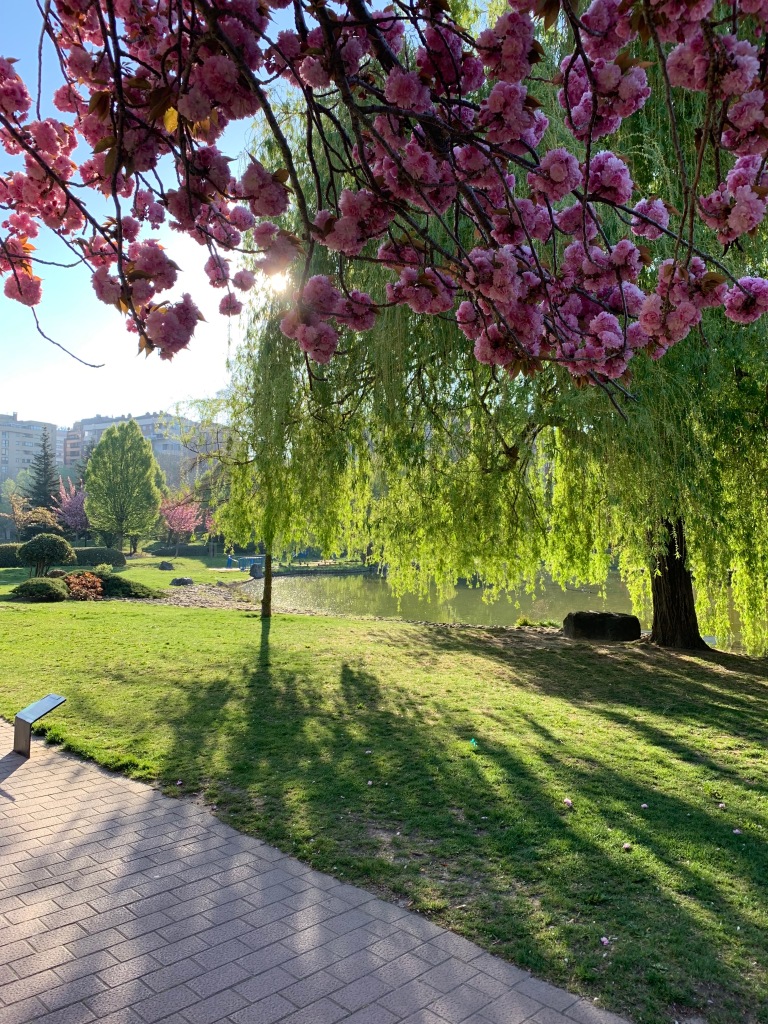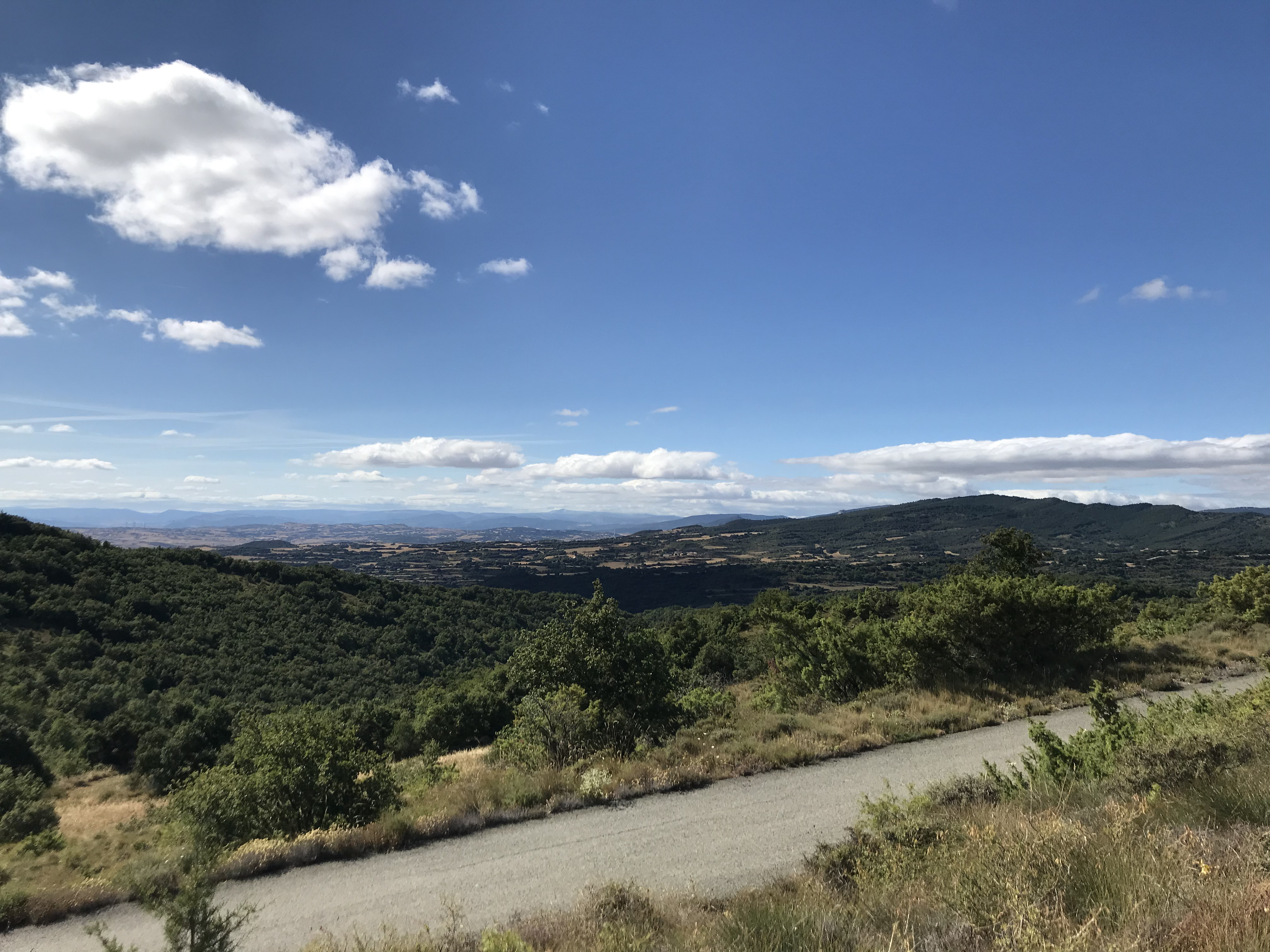Blog Archives
Second Spring

Stop Awhile to Smile
Second spring seems to wreath
Earth’s skin instead of autumn.
Songbirds sing and bees visit
Flowers adorning leaves auburn.
.
Trees sprouting catkins, as if
Winter isn’t imminent, and energy
Best invested in building up
Stores to see it through in utility.
.
I, too, should be inside, busy
Through fall with words, building
For stores ‘ere the festive season.
But I’ll pause here as ev’ning’s gilding
.
Landscape lying ‘neath green veneer,
To fill a vital store of good cheer.

So we’ve had what they call a little summer of St Martin… except it was a heatwave. We were up in the thirties every day for over a week, but since it’s October, it cooled during the longer nights down to the teens. And it seems some trees etc think it’s spring again, with the balanced hours of sun and the high temps. So stuff is spouting. Dandelions are dandy, but trees are just wasting energy.

The scenes, however, since we’ve had some rain in September so I just soaked it all up instead of working, which I should be, to re-edit and republish my first five adult novels.
More on that before Christmas!
Life is short. And it seems even the trees think so.

They say the weather is going to change today. I think it already has.
Spring Springing, Sprung

The Great Unfurling
.
Potted hydrangea upon a windowsill
Sets forth fresh leaves: tender, verdant
Sheets break out along dry sticks, fragile.
I daily watch them form as March marches.
.
Granted the gift of infinity of seconds,
In observation, I wish to break out,
Past the patio to spend
Spring beyond, experience
Every plant’s rebirth and blossoming,
To miss not this great unwinding,
.
From forest floor, wild asparagus and
Ferns unfurling, breaking forth
Each bud, young leaves extending,
Spreading, fat fingered
Fronds from chestnut trunks;
.
Witness every sprig of speedwell,
Burst of buttercups,
Spray of daisies, and breeze
Dancing dandelions, dainty dog violets.
.
Later let me see the fall
Of flower petals to the path,
From each high floral bouquet:
Dashing with pink and white
The grass, creating a colourful carpet,
Delicate to delight our way,
.
Through this season; so short, yet
Too intense to appreciate the display.
Been a busy few weeks with little posting – though a fair bit of poetry and some writing, and lots of reading! But mostly just enjoying the spring, which is blooming lovely, if too dry in a lot of places.
I just spent the weekend down in Andalucia, and the heat is rising quickly there, so it’s almost summer, with swifts screaming in the skies already. On the train on the way down, it was clear many fields will give little harvest this year.
Spring is always my most distracted season and this year is no exception. or an exception to the extent that I’ve decided to spend as much time as I can just soaking it up, so I spent hours staring out the train window rather than writing or reading. Nevertheless, the words come, stored up for winter or spluttered out for a short poem.
Hope you like it.

PS, when I returned after the Easter Holidays the hydrangea was nearly dead, having been left unwatered. I gave it some and hope it will recover (it’s not mine, by the way!)
Enjoying Spring?
.
.
The Enjoyment of Spring
February leaves light frost on the park grass,
But the birdsong cutting the chill silence belies
This skin of sparkling crystals; harkens from
Recently breakfasted birds animated to action
As the era of excitement approaches, already
Cold soil broken by budding narcissus prepared to
Perform their demure golden pouts and beside
The warming morning rays upon me shows
The strengthening sun will soon scatter the ice
And afternoon will even induce disrobing, thus
Dallying in sun-drenched dales.
.
Yet, still, I feel
Almost ill at enjoying these delightful days when
We know elsewhere gale forced storm surges
Swamp grasslands with salt, wind whip trunks
Down like twigs, just as most we need them
Growing. The mountain slopes are bare of snow:
Instead several fires on-going, and a bushel
Of other evils await.
Even here, these trees
Are leaving too soon; petals, peeping weakly
Into shape shall feed few bees this spring,
And we fear for their fruits come summer.
.
For the grass beneath the white seems damp,
But even the soil is dry, and blades soon scorched
As we wait for rains, disappeared more than delayed,
During a drought seeming set to last till March.
.

I wrote this poem after a pause in the park on the way to work, the same day I saw this video of the storm surge back in Ireland where they were hit by several named storms while our farmers in Spain were desperate for rain.
Another Spring

I took a trip to the river some days ago and sat down and thought of how different this spring is – much drier or course, but simply because we can go outside and see it the way we weren’t able to last year.
.
Another Spring
.
The soil thirsts for showers, but still
Seeds sprout green and buds flower.
Warblers and mistle thrushes whistle
Busily from the bramble bushes.
Upon thermals, raptors stall, surveying
Below, from distant forests, cuckoos call.
.
I sit upon a stone wall, watching
Wagtails bobbing below a waterfall,
Remembering, last year, the view
Of a robin, a tree, we then held dear,
And our feelings thence unfree
Behind our self-made fence
As we waited to leave impatiently,
Even as news came to grieve.
.
A brace of ducks take flight as slowly
Afternoon descends to night,
Slapping away the tiny silence, sweetly;
The air is filled with blossom scent,
And as the ducks take wing, I swear,
I shall never miss another spring.
.

the small picture view – how wonderful it is just to see this instead of concrete or our own bare walls inside. Long may we leave our houses and be greeted with life.
February means it’s Spring in some places
They’re Only Daisies
Spring mildness brings blooming back
A splash of buttercups, daisies
And dandelions, and my
Heart soars to see these
.
As if the summer burst forth
In fullness of fuchsia, orchids,
Roses and hydrangea,
Even though they’re only daisies.
.
Perhaps such sights would send
Soul soaring to much higher delight,
But little low pleasures enchant me
Easily, and I find myself exultant
To discover thus elation on a daily basis.
Well, we’ve survived the first month of 2021, which clearly hasn’t turned out as groovy as we’d hoped, so far.
I am patiently waiting, like the rest of the world, on a vaccine to be offered to me. I hope to get one before summer and be able to travel home to see folks.
Besides that, my life is pretty normal, apart from wearing masks all day.
School is still in session presidentially in Spain, and we’ve had few problems since we’re masking and gelling all the time.
My son’s swimming lessons restarted! other after school activities are going on without problems, too.
The bars were open at 30% occupancy, but are now only open for outside seating, but we can have a pincho on a Saturday afternoon with the kids now that the snow has melted and milder weather has returned.
I know it’s not spring here in Spain till the second half of March, but there are flowers out there, and I always stick to my Irish seasons anyway. Except for August. That’s still summer!
And I am feeling hopeful we won’t be kept inside during spring the way we were last year. Just a walk outside the city walls is all I ask.
I’ve written a fair few poems since Christmas, and I am slowly working through my WIP, Palu and the Pyramid Builders – last third of the manuscript, with 200k written so far.
I’ll be looking for beta readers in a year or two!
Meanwhile, I hope to post more poems this spring, and if you’re looking for a quick read, my novels are all still available for the time being, including my newest novella, The Logical Solution.
Crazy Weather… just who’s the crazy one around here?
They say you never know yourself if you’re going crazy… perhaps it seems those around you are tho ones who are really crazy.
We call this weather crazy, but aren’t we really the crazy ones for not recognising it for what it is, and indeed really basically fucking batshit crazy for letting it happen without doing anything useful to stop or slow it, and in fact being the cause of it all…. and all the time knowing that it’s going to come back and not just bite us on the arse, but beat the shit out of us, till any sense we have left will be knocked out of us.

The Reaping of Disdain
Pink blossoms add extra beauty
To an autumnal almond tree:
Orange and auburn leaves left
Before falling with the frost
At least formally expected
If it arrives as it did normally in
November.
Sun and clear sky
Seem apt background to marvel
At young walnuts dotted on a
Bare-leaved tree, wondering if we
Will get a second harvest this year.
Like the oilmen grinning as the
Ice melts for their machines to
Begin drilling without awaiting
Spring,
We reap the short-term
Gains until the true harvest of
Our disdain, ignorance, apathy
Ripens in silent screaming of
Ecosystems stretched to snapping.

Suddenly Spring
Suddenly Spring
How quickly it comes, now, this thing called spring:
Crocuses suddenly splatter bank in violet and blue
Blackbirds burst out with twilight tunes as
Bats trawl back and forth for rising flies proving
This apparent death of winter weather is true.
Considering I was sledding in a village near where this photo was taken yesterday on this very day last year, I only hope a blast of snow doesn’t kill the flowers unfolding, nor catch the bats too early out of hibernation.
Enter September
The Subtlety of September’s Entrance
The bees don’t know it’s September;
They yet forage on the flowers before the porch
Under a sun shining on, strong as August.
Martins and swallows still flit for flies,
Gather on the lines, unready to leave;
Unconcerned the village is deserted,
Windows shuttered underneath their eaves.
None have truck with the times men impose,
Their clocks and dates; assigning names
To days that are every one the same.
Their seasons do not turn on a tick
So they stay on, as we sadly turn away.
Yes, the kids, and I, are back to school, back to Pamplona after summer spent mostly in the village….
And the above is my lament.
But at least the swallows and house martins had a good year, after a slow start where I was worried we’d have a big decrease over last year. There were plenty of flies around this year, though, (really annoying ones!) after a very mild winter that didn’t seem to kill many flies at all.

A few hundred house martins and some swallows assembling on the lines above the village.







